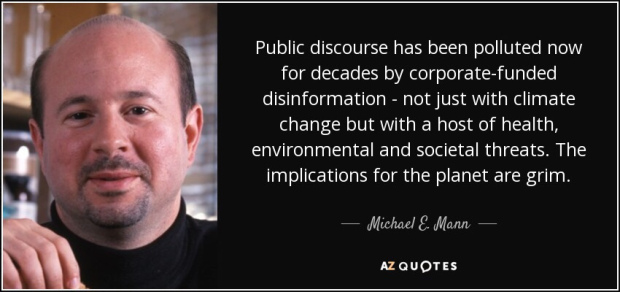The internationally renowned climate scientist Michael Mann today announced he is voluntarily releasing numerous emails that have been the target of legal action by climate denier groups.
Mann, who is director of the Earth System Science Center at Pennsylvania State University, was one of the targets of the “Climategate” email hack in 2009, and his “Hockey Stick” graph of temperature change has long been a bugbear of climate sceptics.
As the Climate Science Legal Defense Fund explained in a recent report: “The federal Freedom of Information Act (FOIA) and state open records law equivalents — designed to promote transparency in government — are increasingly misused by groups seeking to harass publicly funded scientists and inhibit progress in critical areas of research such as climate, biomedicine, and epidemiology.”
As Mann explains, FOIA laws “have been misused by anti-science groups to target scientific research.” These groups – which Mann points out are both conservative and liberal in political perspective – “have attempted to use these laws to conduct witch hunts by requesting years and years of emails from public university professors.”
In climate, attacks on public sector scientists have mainly come from the fossil fuels lobby and the right of the political spectrum. In biotech, however, public university scientists have been attacked by supposedly progressive anti-GMO groups aiming to shut down research in the area of genetically engineered crops.
One group in particular, US Right to Know – which is largely funded by the anti-vaccination and natural health lobby group the Organic Consumers Association – has fired off numerous FOIA requests across the United States and selectively released the results, aiming to embarrass and silence public sector biotech researchers.
Biotech researchers at public sector universities who have been targeted by USRTK attacks include Alison Van Eenennaam, Kent Bradford, Kevin Folta and Bruce Chassy.
Why do anti-science groups focus on email requests? Mann explains: “Because it provides opportunities for hostile groups to take phrases, including scientific jargon, out of context in order to mislead and confuse the public. And because the time-intensive demands of legal review and litigation diverts time, energy, and resources away from science.”
 In terms of releasing his own emails, Mann wrote: “Of course, I wish I did not need to do this.” However, he added that since “these emails will be handed over any day now to David Schnare” – a lawyer working with conservative groups with links to the fossil fuels industry – he hoped “to use this exercise instead as a teaching moment and an opportunity to further public appreciation and understanding of science.”
In terms of releasing his own emails, Mann wrote: “Of course, I wish I did not need to do this.” However, he added that since “these emails will be handed over any day now to David Schnare” – a lawyer working with conservative groups with links to the fossil fuels industry – he hoped “to use this exercise instead as a teaching moment and an opportunity to further public appreciation and understanding of science.”
As Mann points out, transparency is important in science. “Anyone who truly cares about the research can and should review the published papers and underlying data, directly evaluating a study’s methodologies, analyses, and conclusions. But seeking thousands of emails serves only to stifle collaboration and discourage the frank, creative exchange of ideas, and chill the candor needed during the confidential peer review process.”
Those wishing to protect scientific endeavour against attacks by anti-science groups opposed to action on climate change can support the work of the Climate Science Legal Defense Fund by donating here.
